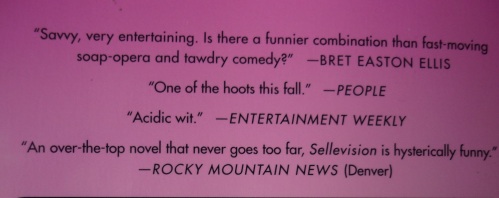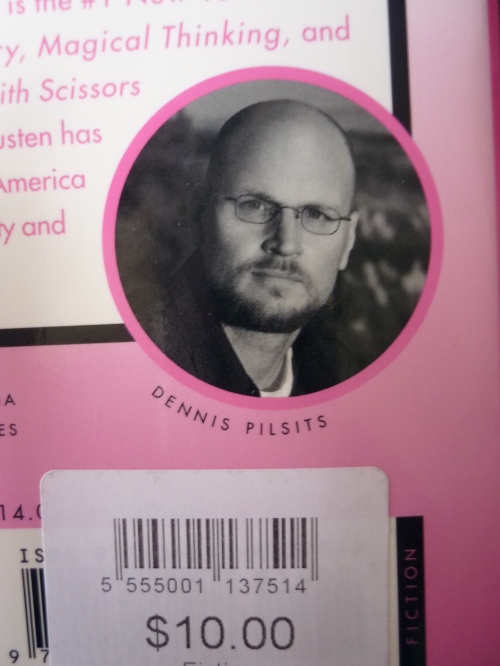After being so pleasantly neutral about The Guy, The Girl, The Artist and His Ex, it’s sort of morbidly satisfying to have the next obscure novel plucked from the sales shelf be one that I’m so baffled and outraged by.
Hey, it sounded fun—after all, what could be more ripe for comedy than the quirky, white-lit, commercial world of a home shopping channel? There’s something intriguing about that alien landscape and the glittering hosts who rule over it, whether they’re joyfully explaining what this particular powder makeup can do to clear your skin and improve your life or playing out entertaining fabricated loops of domestic bliss vs greyscale footage of clumsy terror in infomercials.
For some people, existing and thriving in this weird world of advertising is their job and their life. Sellevision asks “what must it be like behind the scenes?” in… what I assume was meant to be a satirical way.
Where do I even start with this? Here are the plotlines followed in the novel, based around the hosts of the TV shopping network:
- Max, the only openly gay member of the cast, accidentally flashes a studio audience and the viewing public. Having exposed himself, and horrified mothers and housewives everywhere, he is fired and has to find a new job. Or a new boyfriend. Whichever boosts his self-esteem more.
- Peggy Jean, obnoxiously wholesome Christian housewife and TV host, starts receiving obsessive and threatening emails that send her into a state of anxiety and a subsequent addiction to Valium and the alcohol she washes it down with. Meanwhile, her son is planning to blow up a school and her husband is lusting over their sixteen-year-old neighbour.
- Bebe has a shopping addiction and also meets the man of her dreams. There’s a sloppily set-up moment of tension where she thinks said man of dreams might be her long-lost brother, but otherwise literally nothing happens except for the two of them having a great time. Also her house burns down.
- Leigh is having an affair with her married boss, who keeps promising to divorce his wife and be with Leigh who he loves, darling, he promises, just give it time. Leigh conspires with Max and eventually announces her relationship with the boss on live TV, dumping him and earning fame in the process.
- Trish is an awful and ambitious Rich Blonde Bitch who wants everyone’s screentime to be hers because she’s awful..?
- Adele, a red-haired Irish Catholic, is being boosted as the network’s “diverse” host because she has 5% Native American blood on her mother’s side.
Where do I even start? Content warning from here on for stalking, alcoholism, statutory rape, homophobia, and almost but not quite incest. Thanks Bebe.
Off the bat, this is clearly meant to be a satire. Commercial media is perfect to satirise, as what we’re trying to sell to each other and how we sell it is always a great indicator of society, and the problems within—see all those nice 1960s ads about how “it’s nice to have a woman about the house”, the perfect housewife there presented as a bearskin rug her husband is stepping on, having clearly conquered. Making fun of ads like that, for example, points out the awful sexism of the era—we laugh at it, but also realise that it’s drawing our attention to a deeply problematic aspect of our lives that we ought to think about. Satire is scathing and can sometimes push boundaries, but most importantly it comes with a greater message. Maybe this is what Augusten Burroughs set out to do, but I’m not sure if he pulled it off.

Riiiiiight
Mostly because… most of the subject matter isn’t funny, nor does it serve a greater message. The entire book is written in the airy, flippant tone that implies it’s comedy, and a lot of the description is laden with brand names and detailed item descriptions to echo the product-based consumer culture in which these characters live and work (and the advertising language of the network itself). This is deliberately overdone, an act of satire, drawing our attention to how ridiculous seeing the world like this is. This is funny. However the tone doesn’t shift when the subject matter does, leaving Peggy Jean’s mental breakdown and time spent in rehab presented in the same bubbly prose as everything else.
I get that the aggressively wholesome suburban Mom spiralling downhill into substance addiction is a classic joke, because it juxtaposes the shiny outer image with a rotten inner one and, again, draws our attention to the problems in this cultural archetype, i.e. how it’s kind of messed up that some women are so dedicated to maintaining a certain image of American Dream perfection that they crack under the pressure. Satire! Dark humour! But Peggy Jean’s arc was all about being stalked and harassed to the point of her needing to be hospitalised, after which her life basically fell apart. There are a couple of genuinely (using the word loosely) funny moments, for example when she mentally resolves not to be one of Those Mothers that has no idea what’s going on with her children, leading them to violent behaviour… and as she congratulates herself for raising and connecting with them so well, unbeknownst to her, her sons are making fun of her and pretending to shoot each other in the backseat of the car.
Her self-described perfection is visibly juxtaposed with her children acting exactly the opposite of what she presumes, and in “being a good parent” she’s actively and obliviously ignored the true character of her sons in favour of the Perfect Suburban Family ideal she has in her head. That was satirical juxtaposition, that was making a point, that was amusing, and relatable. Peggy Jean having a panic attack was not. And holy crap, neither was her husband starting a sexual relationship with the sixteen-year-old, who is every bit as kinky and voracious as a paedophile could wish for. The ‘punchline’ of that, again, poorly set-up plotline, is that the sixteen-year-old is totally into the married suburban dad and they have lots of hot steamy illegal sex. Nothing about it was particularly funny, unless statutory rape is this author’s idea of a suitable joke. I don’t want to think about it.

Don’t give me that look
Bebe’s storyline went in the other direction; while Peggy Jean’s was pure horror, Bebe’s was wonderful and fun and boring as a lawn and arguably pointless. A ham-fisted mention of her long-lost brother, adopted out at birth, instantly begs the question “are she and her loverboy accidentally committing incest?” This vague and weird Mortal Instruments-esque tension lasts about ten seconds in reading time. Phew, we’re not related! Time to continue our lavish, happy romance, which isn’t even impeded by Bebe’s shopping addiction, which Loverboy ends up finding endearing. There is no conflict save for her house, and all her purchased possessions, burning down at the absolute tail end of the storyline, resolving and adding nothing. Guess now Bebe’s going to have to live a less materialistic life! How will she cope? Will she learn that her definitely-not-incestuous love is more valuable? And why the hell didn’t that happen in the middle of her storyline, as opposed to the entire thing being descriptions of her drama-free Parisian romance?
Max, at least, ends up not being a gay stereotype even if he’s peppered by the clichés that chase him and other characters through the book—he loves stage musicals and certain singers, of course, and is vain enough to refuse to borrow someone’s low-class underwear, which leads to him exposing his dick on TV in the first place. To a family audience, of course, so that a little girl identifying Max as “the man who showed me his thingie!” can be used as a joke, because yay, what’s more fun, hilarious and definitely not harmful than the association of The Gays with paedophiles??
Are you ever just so maddeningly confused at how a book that had so much promise ended up being a clusterbomb of things that offend you? With bonus forbidden-love-due-to-maybe-incest? Never saw that one coming. Except I did, because this author foreshadows with, and generally has the tact of, a brick.

AND THE COVER IS AWFUL
Like this blog? Have you considered showing your appreciation through coffee?

Pingback: Overthinking Bargain Books: Hold Me Closer, Necromancer | The Afictionado